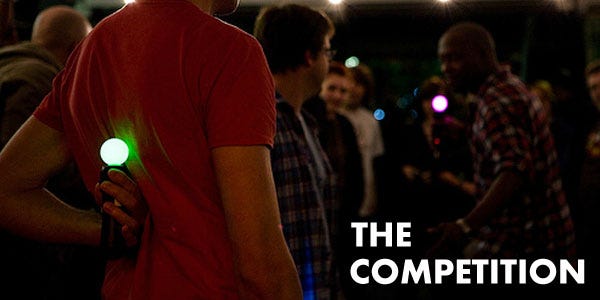The Competition: The Story Behind The IGF's Critics
Fez, Fish, And Other Animals
“There’s no plans to bring Fez out on any other platforms?” I ask Phil Fish, as he finishes off his sandwich. He chews and I mutter an inward prayer. Oh Gods, let him say PC. “We’re not even thinking about it right now,” he says. “I mean, ultimately, I would like to see it on everything. Why not? But we do have exclusivity with Microsoft, as you do – you find it’s really hard to not do that.”
The Gods are useless. Never pray.
After our interview, I walk down the building’s stairwell to rejoin the frivolities at this year’s GameCity Festival in Nottingham. Simon Parkin, of international games journalising renown, walks past me on his way to talk to the developer. We exchange a look.
He doesn’t recognise me. I can tell by his quizzical squint. But we’ll see. Parkin’s not the only one who can do industry-tumbling, gut-busting investigative reporting with stories that flow full circle. I’ll show you, Parkin. We humans are competitive beasts, and I’m no exception.

Fez, a novel puzzle-platformer in which you shift between 2D perspectives, may not be coming to PC any time soon but the game is significant in a wider sense. Significant because it has been nominated for two prizes at this year’s Independent Games Festival awards when a few vocal critics have argued it really shouldn’t have been.
The controversy is summarised thus: In 2008, Fez won in the Excellence in Visual Arts category at the IGF. It certainly is a lovely looking game, I can personally testify to that. In 2012 it remains unreleased and subsequently re-enters the IGF for that year (and is eventually nominated for both the Technical Excellence award and the Seamus McNally Grand Prize).
Noting that Fez has previously won an award and judging its re-entry to be unfair, a Twitter mob forms, led by developer and vocal IGF critic Anna Anthropy. Independent devs are mobilised and throw together a Pirate Kart – a collection of 300 games banged together at short notice and entered into the IGF at the last minute. Some see this as a digital protest against the competition’s unfit rules and high entry fees (it costs over $90 to enter a game). Some see it as a fun way to throw a bunch of games together, in the spirit of previous Pirate Kart. But whatever way they see it, nobody doesn’t see it.
“The Pirate Kart was a lot of things to a lot of different people,” says Anna Anthropy, months later. “But yeah, for me it was definitely a reaction to that [the controversy over Fez]. It was about putting all these games in the IGF that are valuable games.
“I mean, it raised a lot of awareness both of these games that would never have been so widely played if the Pirate Kart hadn’t existed. And also just [awareness] of the fact that the IGF is bullshit.”
I ask her what she means by that.
“The fact that Fez can have already won an IGF award and now it’s nominated for – what is it? – I think two awards, including the Grand Prize? I think it’s a really good reminder that the IGF is all about cliquey-ness, the scenesters that I yell about. The fact that it’s about the established – quote, unquote – indie scene. Not about what’s really exciting about DIY games, you know – the fact that anyone can make games.
Anthropy feels that outsiders, the people who really need access to an audience via these sorts of events, are being left out. They're being left out, she argues, in favour of established names.
“Phil Fish – he’s already won,” she says. “He’s already got a contract. He’s already got money. Someone who is working out of their bedroom to who – whatever the prize is, like $5000 [the Grand Prize is actually a stunning $30,000] – would be something life-changing for them. This would be an opportunity to get more press than they’ve ever got in their lives but instead the press is regurgitated back to the people who already got the most of it and I think that’s really sad. And I think all that does is keep more people out, more of the people that I’d like to be in, that I’d like to be involved.
“All it says is that, ‘Oh, these people are indie. These people are superstars.’ They’re not.”

That said, Phil Fish re-entering the contest wasn’t against the rules per se. There was nothing that prevented previous winners from entering. Technically speaking, it was a legal move, although that's changing. And, ultimately, the IGF is still a competition. Surely it isn’t beyond anyone’s imagination that a contender will come along and wipe the floor with Fez? A David to their Goliath?
“Well, frankly that’s not going to happen,” says Anna. “Certainly there are a handful of interesting, really interesting, small games that manage to squeak in every year but they sort of squeak into lesser positions.
“Like, the Nuovo Award exists now and that’s to allow those kinds of actually interesting, weird, experimental games [their own] tiny space in the IGF. No. All of the games that are really interesting fall through the cracks because the awards are structured in such a way to lead to these very particular kind of games." Anthropy argues that the very category-based system of judging is not conducive to focusing attention on interesting oddities, and so the judges are pushed towards the familiar games. “So the IGF judging process is built to filter out – whether consciously or unconsciously – a lot of games that are really deserving of attention.”
But is that really the case? Is the judging process really so bad? This reporter wants to know. There’s only one way to find out if the judges agree with Anna’s diagnosis. Time to hit the streets. I mean the internet. Okay, Twitter.

This is how real reporters operate. The BBC. Simon Parkin. Those sort of people.
Anyway, the IGF works by assigning a big group of judges, picked from the industry by the organisers. This is a group of anywhere from 100-200 people who sit at home, possibly in their underwear, and play through assigned games making nominations as they go. Essentially, this under-dressed army of evaluating gamers work as a hive to create the shortlist of each category. From this point it’s up to a smaller panel of ‘jurors’ to decide which finalists win.
I spoke to three of these judges and the consensus among them is that the process was mostly fair but also that there are areas which could be improved. The judges I spoke to asked to remain anonymous. Which is exactly what happens when you do real, ball-busting investigative reporting. Everyone is afraid. The internet has EARS. “Personally I would've liked to see more categories,” said one of the judges I spoke to. “There's not one for writing for instance which I think is a shame, especially since so many games would've fit the criteria. The Nuovo award feels a bit like a catch-all for any games that have that special something but not necessarily because of any of the categorised reasons.”
Unfinished games being entered is another conundrum that faces judges, as prototypes and works-in-progress have always been allowed to enter the IGF.
“I found it a bit difficult when unfinished games came up. I can deal with content-locked, unfinished builds, but in one instance I was given a game to judge which was nothing but the opening cutscene and first unfinished screen. What are people meant to say about that, really?
“Then again, those kinds of games don't get nominated because, well, they pretty much can't be, so that's more down to the discretion of the developer rather than a flaw in the IGF setup. I think maybe having a category for unfinished games would be better, if it had its own award.”

You can probably see why unfinished games are permitted – to allow games in alpha or beta stages to get the money and publicity they need to continue development. But no other medium would allow an unfinished work to enter a competition. Could an unfinished movie be nominated at Cannes? No. So why does the IGF allow it, and is this a good thing or a bad thing? “When it comes to comparing, say, unfinished prototypes from solo developers with finished $100k projects from large teams, I can see why some people would see this as suspicious or unfair,” said another judge.
“But I didn’t find this a problem at all... You can get a sense of how far into development the game is, whether the artwork is placeholder, the prior experience of the developers, the budget. If you have experience of what alpha versions of games are generally like, then it’s surprisingly easy to spot one and judge it against a finished project.”
The judging process has come under rather more intense pressure this year, however, with one developer claiming that judges were not even playing their game.
Kale in Dinoland, an iOS port of a Gameboy title from 1992, was only played by five out of eight of its judges. And only one of those played for longer than a few minutes. In response to this complaint by the developer of this game, IGF chairman Brandon Boyer replied:
“All of our judges and jurists are professionals who very generously volunteer their time, year after year, to look at an ever-increasing number of entrants, for no reward other than a genuine desire to help foster and grow and reward achievements in the independent game development community.
“Some have or make more time to devote to this than others ... The IGF, contrary to the most creative of the conspiracy theories, is not a shadowy elite who conspire to promote their own, it is very simply a few hundred game developers, academics and journalists of every stripe, all of whom volunteer for this job solely because they are enthusiastic about independent games, but all of whom also must have to deal with new babies, and crunch-times, and fall ill and can be forgetful and distracted.”
The difficulty of organising a remote taskforce of volunteers certainly shouldn't be underestimated, but this response didn't convince everyone. It certainly didn’t seem to convince Mike Meyers, the lead organiser of the Pirate Kart, who replied:
“It must be nearly unavoidable that problems like these will happen. But when it happens, don't make excuses about how hard it is, or how busy your judges are and especially don't blame the entrants or the way their games work. It IS hard and judges ARE busy, but that isn't the entrants' problem! They paid the $95 under the clear understanding that their game would get seriously looked at by judges and have a fair shot in the contest. If that doesn't happen, whatever the reason, then the IGF failed to do it's job [sic]. The proper response is to own up to that, apologize, and continue to try and prevent it from happening again.”
I sit down in the ‘Fez room’ at GameCity Festival but I have made a grievous error. I have chosen a terrible chair. It lurches dramatically in response to every tiny shift of weight, completely untameable. I pretend to watch Fez on the big screen as someone jumps around from platform to platform but really I am eavesdropping on a conversation behind me, as Phil Fish speaks to another journo about the IGF controversy. I lean back and almost fall as the seat wobbles unsteadily. Damn you, chair. I won’t have this humiliation. I am a prize-winning jockey and you are my stallion.
I overhear the words, “No, I get that it’s a dick move but...” Whoever it is, that journo had better not be after my story.
I play Fez for a bit and curse the Gods. Not on PC.

The truth is, the organisers of the IGF already know all these problems exist. A letter from IGF Chairman Brandon Boyer, posted on the festival’s website, details that changes will be made to existing rules. Among these, the organiser insists that they are “taking gradual steps to limit prior finalists from re-entering the same game.”
“One of my strongest beliefs is that none of us here at the IGF should act as gate-keepers, rejecting developers as they file in to enter their games, for any reason,” Brandon says. “That said, we would like to see the games coming into the festival being prepared for the festival, just as it operates in other creative fields... we're making an official stance that finalists of IGF 2012 will be discouraged from re-entering their game in 2013.
“The idea is to leave those finalist slots (not to mention judge & jury assignments) open for new works.”
The letter goes on to explain that 2012 is a “transitional year.” Any entrants that have entered previously would not be discouraged this year, which explains Fez. Basically, the organisers appear to have agreed that re-entries are against the spirit of the competition and it looks like 2012 is the last year we’ll see this happen. But this letter was posted in June, before the contest got underway. Why the leeway? Why have a “transitional year” at all? Why not just change the rules and be done with it?
“We tweak and mod and tune bits of everything every year,” ansers Boyer. “But it won't be until after GDC that we pull the team together to figure out how best to guide 2013, and I don't want to over-promise and under-deliver anything by anticipating what those changes will be at this point.
“Certainly what constructive feedback we get from developers and judges themselves will be taken into account, and I've always got no shortage of ‘big ideas’ for how I'd like the festival to operate more smoothly.”
But even when this rule does change it will be far from straightforward, as RPS’ own Bargains and Bins Correspondent, Lewie Proctor (who was a judge this year and is not afraid of the internet’s ears) points out.

“Obviously that's not going to be entirely simple to police,” he says. “Is a game with a few new bits added and a ‘2’ after the name a new game? What about a game with the same name that has been totally rewritten and all content redone?” Not exactly unprecedented.
Overall, the judges seem to be mostly happy with their role in the competition. But the judging process isn’t the only thing under fire. Concerns have also been raised about the credibility of the Audience Award, which asked the public to vote on a game to win out of all the finalists. The complaint being that many of the games included in the shortlist can’t even be played yet. Johann Sebastian Joust, Botanicula, Fez, Antichamber, Faraway, Gunpoint, Mirage and Storyteller were all choices in the public vote despite being unreleased and having no publicly available demo. Waking Mars and Proteus have since been released, in full and beta form respectively, but were also not publicly available by the time voting had closed.
On the audience award, the IGF submission rules state:
“Public voters will download demonstrations of the games and vote for their favorite - the game with the most votes will win the award. Entered Games must have a playable public demo when asked by the Nominating Committee (likely to be around January 2011) to be considered for this category, but do not need to submit a public demo with initial entry.”
But later the IGF Chairman Brandon Boyer said this rule would no longer apply.
“We're allowing voting for any game chosen as a finalist in the festival, as opposed to just those with public PC demos,” he said, when public voting was opened this year. “This is because many of the titles have been playable at other indie game events – or have Beta and other OS versions that many indie game fans may have checked out.”
In a way, he’s right. Many of the entrants actually do have playable builds of these games, which have been showcased at events. Proteus was demoed at A Bit of Alright (among other places) and Johann Sebastian Joust has been doing the rounds at a number of events. And of course, Fez was shown off at GameCity.
But these games are not available to the public at large. You can’t go online and buy them or try them out anywhere, which challenges the validity of an openly public category in which absolutely anyone with an internet connection can vote. You have to have been at one of these events to have played the games.
I asked Boyer if the IGF plans to change the way the Audience Award works but he declined to comment.

I discover myself sitting in a vegan cafe in Nottingham town centre, surrounded by pescatarians and other undesirables. I put my headphones in and listen over the interview. Again, here he was: the source of the controversy.
“No, I totally get that it’s a bit of a dick move,” Fish says. “But it’s my job to promote this game the best I can. There was so much reaction like, ‘Oh, don’t enter it again, you don’t need the attention, you have enough attention right now.’ But the game isn’t out yet. It’s not a success, I’m not Minecraft at this point, like, I haven’t made a single dollar in five years. I have only accrued hundreds of thousands of dollars of debt that I need to pay back. There’s not going to be a point before release where I’m like, ‘All right, that’s enough hype. I’m just gonna sit down and wait for the game to come out.’ We are systematically entering every contest, every festival, everything that we can enter.”
But will the judges allow it? Will Fez be tainted by the controversy?
“I hope that the judges judge the game on its merit and don’t have a bias based on, like, ‘Oh, you won before so I’m not going to give you a good score.’ I think that would be... that would be really shitty of them. Like, that’s their job.”
Fish knew that re-entering Fez would be controversial even before he did it and admits that he was conflicted about the decision himself. But after asking Brandon Boyer about it and being told the game had changed enough to allow a re-entry, his concerns dissipated. At that point, he says, he knew what the IGF wanted.
“The IGF wants the biggest, best games to enter the competition. They want their competition to be fierce. They don’t want the best game developers to sit it out and be like, ‘Oh, we’re too good and this is the kid’s table.’ They really hate that kind of conception that the IGF is a scholarship. It kind of used to be. It kind of was for us – it got us started, it got us the attention of publishers and it got us the Microsoft deal and all that – but that’s just a bonus, that’s just a positive side effect.
Fish argues that the IGF just want their ceremony to matter to be people, and he points to how Monaco took the grand prize despite being totally unfinished at the time. (And it is totally awesome, too – RPS.)
“My favourite kind of reaction we’re getting so far from the IGF is... people feel like it’s not fair. That we’ve had five years to enter this game and we’re entering it. But it’s like, it wasn’t easy, we had to work hard for that. It wasn’t like we won the IGF and that just ‘made’ the game. No, we won the IGF and we had to work our asses off for five years.
“It’s like, ‘Well, if you can’t compete with us, then you can’t compete with us.’ It’s a competition, I’m not going to hold anything back.”

The subsequent Pirate Kart was seen by some as a direct protest against Fez’ re-entry. Does Fish see it that way?
“Well, the Pirate Kart was its own thing just before that. It was a ‘let’s-get-together’ thing and Anna Anthropy kind of made it... It’s kind of coming up as a big ‘Fuck You’ to the IGF.
“I dunno what’s going to happen with that because it’s kinda not a legal move that they’re doing. The whole idea was to bypass the fact that you have to pay a hundred bucks to get to the IGF. Now, they’ve got – what – two hundred and something games on there? [The final count was three hundred games.] If I was a judge at the IGF this year and I was assigned the Pirate Kart, I’d be like, ‘Nah. I’m not gonna play three hundred games, are you fucking crazy?’
It’s common practise for indie devs to rattle their glasses and make noise about the industry. To some, the Pirate Kart underscores a splintering within the community into different tiers – the supported, well-marketed indie and the very obscure, unsupported indie. But to Fish, the idea that there is a class system breaking out is nonsense.
“It really annoys me when people make that distinction because it’s not like I was born with a silver spoon in my mouth and everything was easy. I had to make a really good game and work really hard to promote it to get where I am today, where it’s well-known even before it came out. I didn’t just start out with a hit on my hand."
“There’s this whole mentality on TIGSource and places like that, that there’s this indie elite – that there’s like this secret society of friends that are manipulating everything behind the scenes... this secret elite behind the scenes and that we’re all friends and that we’re only helping each other. It’s such bullshit."

I smile at the prospect of indie conspiracy theorists. Four of the people who have worked on Fez were jurors in the 2011 competition – Rich Vreeland, Paul Robertson, Renaud Bédard and Phil Fish himself. To some, they are members of a magic circle – the indie Illuminati. To Phil, they’re a group of friends. He laughs at the idea that there's anyone somehow pulling the string of the indie scene.
“Yes, I’m good friends with Brandon Boyer and he’s running the IGF but I don’t think he’s gonna let that...you know, he’s not going to be biased towards us. The guy, he takes this very seriously. It’s just, yeah, we’re a bunch of friends but it’s not like because we’re a bunch of friends we’re all secretly helping each other out to trump the even littler – littlest – guys. There’s so many people on TIGSource that feel like they’re being fucked over by the indie elite. There’s no such thing! The fact that indie games has become a scene just pisses me off. Because now there’s all this scene drama and jealousy and enemies...”
As an outsider, it once seemed that indie games were an ideal world where everybody got along and knew each other. A diverse group of artists united in their dispossession. But it doesn’t seem to be that way. Why?
“Well, it just got too big,” says Fish. “It became a bigger thing... There was a certain sense of community that was tighter some time ago than now because the whole indie movement-idea-thing just blew up and now everybody wants a piece of that pie.”
But that sense of dispossession still exists, even among those deemed part of the ‘magic circle.’
“We don’t have many tools at our disposal to promote the game, we don’t have money for advertising or PR or anything. The best we can do is enter competitions and win awards and get people’s attention that way, so I’m not gonna stop that. I don’t think it’s reasonable to expect me to just sit this one out, like, ‘No, Phil. You’ve had enough. Let the little guy have a shot at it.’ Hey, if the little guy has a game that is so good that it can beat out Fez – amazing."
Fish expands on this: “That could happen. It could be a prototype that’s gonna beat out everything this year and be such an amazing idea that it’s gonna beat out completed, finished games. But if not, like –“
He pauses briefly, searching for the right words. The right gauntlet to throw.
“Make a better game than mine.”

At GameCity the sun sets and the Wild Rumpus begins. A pub filled with games and drunkenness. I ponder Fish’s words with the benefit of two pints of Midlands ale. The IGF may not be working quite as intended, but it seems its creators are aware of the bugs. The fact that unfinished things can enter make it an unorthodox competition , while the Audience Award seems like a misnomer at best. Meanwhile the judging process looks like one of the hard problems of game industry, with an oversubscription of games whose only flaw is that they are too unusual to be categorised, and a volunteer group of judges who might be too busy to actually do their job.
But are these buggy elements enough to label the competition unfair? Or broken? Or “bullshit”? The fact that it is being continuously reformed should give us a little faith. CMP's bossman Simon Carless, one of the brains behind the IGF told me that "we're continually fighting to improve quality and transparency." That does seem to be true, despite recent troubles.
What should also give the organisers of the IGF faith is that they are important enough to come under criticisms like those I have listed here. This competition matters.
Back at GameCity I peer over the hairstyles to see a group of people playing Johann Sebastian Joust. Feeling a sudden merriment, I wander through the pub for a closer look. In Joust, you hold a PlayStation Move controller as still as possible while simultaneously trying to knock or shake the controllers of the opponents around you. I was once thrown into a loudspeaker and got a black eye playing Joust. It is a brutal game.
The crowd encircles the players, giving them space as they dance around each other cautiously. I look around. And there he is. Parkin. Of international games journalising renown. Slapping controllers left and right, knocking everyone out with swift, wide swipes, no longer a man but a bear. A great tall, jousting bear. Wearing skinny jeans.
Someone offers a controller and I’m in there like a timber wolf. I attach the controller firmly to my hand and stand across from Parkin in the makeshift arena, distant words of Tyler Durden resounding in my skull. I will end this man’s reign of terror. He recognises me this time (Twitter) and extends his hand in salutation.
“Good to meet you!” we probably said at each other as we shook hands.
The game begins. Out of nowhere I get a hard open palm to the back. I’ve been knocked out after just two seconds. A complete stranger in the crowd raises his fist revealing the controller he had been hiding all along. Secreting your controller is not against the rules of Joust per se. But I can’t help feeling a little hard-done-by. The offender shrugs his shoulders and smiles. In my mind, I hear him say: “I get that it’s a dick move but...”
Parkin goes on to win the round. I offer my controller to someone in the crowd and they snatch it ravenously.
We humans are competitive beasts.
And the IGF was always a competition.

[Jim's footnote: I'll eat my fuckin' trousers if Fez doesn't come out on PC as soon as the MS exclusive is up.]

















